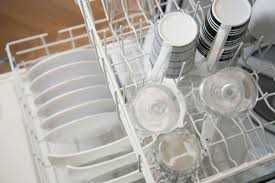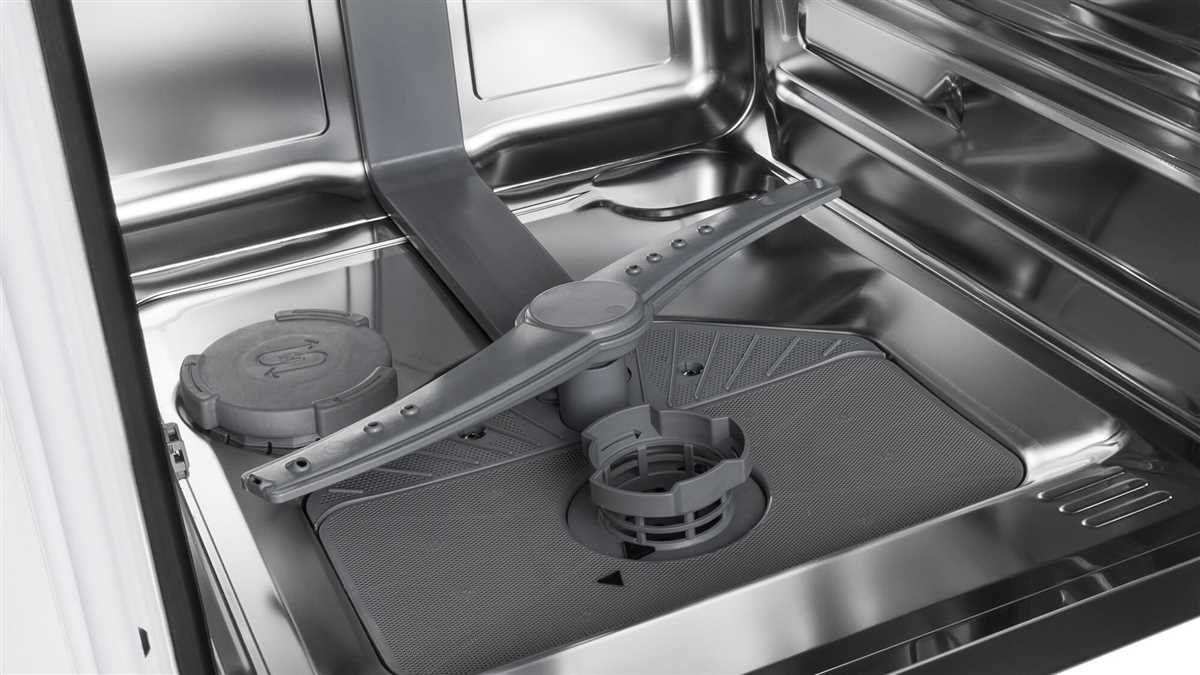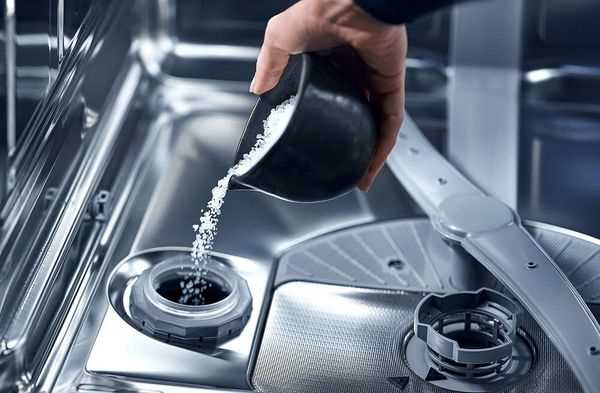
Have you ever wondered why dishwashers need salt? Well, when it comes to cleaning our dishes, dishwashers are an essential appliance that helps us save time and effort. But how does it actually work? In this article, we will explain why dishwashers need salt and how it helps in the cleaning process.
Dishwashers work by spraying water onto our dishes to remove food particles and stains. However, if your water has a high mineral content, it can leave behind limescale buildup and affect the efficiency of your appliance. This is where salt comes in. Adding salt to your dishwasher helps to prevent limescale buildup and ensures your dishes are cleaned more effectively.
So, how does salt in the dishwasher actually work? Salt functions by regenerating the resin beads present in the water softener within the dishwasher. These resin beads attract and remove the hard ions (calcium and magnesium) from the water, preventing limescale from forming. In addition, the salt also helps to enhance the performance of rinse-aid, resulting in cleaner and spot-free dishes.
If you’re wondering how to use salt in your dishwasher, it’s actually quite simple. Most dishwashers have a built-in salt dispenser or a designated area where you can pour the salt. Make sure to regularly check the salt indicator and refill as needed. It’s also important to use dishwasher salt specifically made for this purpose, as table salt or other types of salt may contain additives that could damage your dishwasher or leave residue on your dishes.
In conclusion, adding salt to your dishwasher is essential for better cleaning and preventing limescale buildup. It helps regenerate the water softener resin beads and enhances the performance of rinse-aid, resulting in sparkling clean dishes. If you have any further questions or need assistance with your dishwasher, please contact our customer service. We are available 24/7 to help you with any issues you may have.
Dishwasher Performance
A dishwasher is a valuable appliance that helps to streamline the daily task of cleaning dishes. Whether you have a busy lifestyle or simply want to save time, a dishwasher can be a great asset in any kitchen. However, to ensure that your dishwasher performs at its best, it’s important to know how to properly maintain it and understand the role of certain components, such as salt, in its functioning.
Why do dishwashers need salt? Well, when it comes to cleaning dishes, water plays a crucial role. Tap water contains mineral ions, such as calcium and magnesium, which can lead to the formation of limescale. Limescale can cause various issues in the dishwasher, including poor cleaning performance and blockages. The purpose of salt in a dishwasher is to soften the tap water by replacing the mineral ions with sodium ions, thus preventing limescale from forming and ensuring your dishes come out clean and spotless.
So, how does the salt function in a dishwasher? The dishwasher has a built-in water softening system that consists of a salt reservoir and a ion-exchange resin. When you add salt to the reservoir, the dishwasher uses this salt during the cleaning process. As the water flows through the resin, the calcium and magnesium ions are exchanged for sodium ions, which prevents limescale buildup.
How often do you need to add salt to your dishwasher? The frequency of salt addition can vary depending on the hardness of your tap water. It’s recommended to check the water hardness in your area and refer to the dishwasher’s user manual for specific instructions. Typically, you will need to fill the salt reservoir every 1-2 months or after around 80-100 washing cycles. Some newer dishwasher models have a salt level indicator that will let you know when it needs to be refilled.
In addition to salt, rinse aid is another important component in dishwasher performance. Rinse aid helps to prevent water spots and streaks by reducing the surface tension of the water, allowing it to flow off the dishes more easily. It also aids in the drying process, resulting in shinier and more sparkling dishes. Rinse aid is typically added to a designated compartment in the dishwasher and should be refilled regularly.
Now that you know the importance of salt and rinse aid in maintaining dishwasher performance, it’s essential to make sure you choose the right products for your dishwasher. Always refer to the dishwasher’s user manual and follow the manufacturer’s recommendations for the type and amount of salt and rinse aid to use.
If you’re experiencing any issues with your dishwasher’s performance, such as poor cleaning or limescale buildup, it may be a good idea to contact customer service or schedule a dishwasher repair. They can help you troubleshoot and resolve any problems that may arise. Regular maintenance and proper use of salt and rinse aid can significantly improve your dishwasher’s performance and extend its lifespan.
Water Softening
One of the main functions of dishwasher salt is water softening. Hard water contains high levels of minerals, such as calcium and magnesium. These minerals can cause limescale build-up and reduce the effectiveness of your dishwasher. Water softening is the process of removing these minerals from the water, resulting in cleaner dishes and a more efficient dishwasher.
When you use dishwasher salt, the salt ions exchange with the calcium and magnesium ions in the water, resulting in softer water. The softened water then helps to dissolve detergent more effectively, improving the cleaning power of the dishwasher.
If you live in an area with hard water, it’s recommended to regularly use dishwasher salt to prevent limescale build-up and keep your dishwasher running smoothly. The amount of salt needed varies depending on the hardness of your water, so it’s important to check the manufacturer’s instructions for your specific dishwasher model.
Using dishwasher salt can provide several benefits:
- Prevents limescale build-up: By softening the water, dishwasher salt helps prevent limescale deposits on your dishes, glassware, and the interior of your dishwasher. This can extend the lifespan of your appliance and prevent the need for costly repairs.
- Improves cleaning performance: Soft water allows the detergent to work more effectively, resulting in cleaner dishes and glasses without residue or streaks.
- Reduces water spots: Soft water helps to prevent the formation of water spots and mineral deposits on your dishes, leaving them sparkling clean.
- Keeps dishes and glassware looking new: By preventing limescale and mineral deposits, dishwasher salt helps to keep your dishes and glassware looking new for longer.
It’s important to note that dishwasher salt and rinse-aid are different products with different functions. While dishwasher salt softens the water, rinse-aid helps with the drying process by reducing water droplets and improving the overall drying performance of your dishwasher. Both products are recommended for optimal cleaning and drying results.
In summary, using dishwasher salt is essential for homes with hard water. It helps to soften the water, improve cleaning performance, prevent limescale, and keep your dishes looking new. Make sure to regularly check and refill the salt container in your dishwasher to ensure uninterrupted water softening and a well-functioning appliance.
Mineral Buildup Prevention
If you’re experiencing issues with mineral buildup in your dishwasher, it’s important to understand how to prevent this problem from occurring. Mineral buildup can lead to poor performance and even damage to your dishwasher. Here are some tips to help you prevent mineral buildup:
1. Use Dishwasher Salt
Dishwasher salt plays a crucial role in preventing mineral buildup in your dishwasher. The salt helps to soften water and reduce the formation of limescale. By adding dishwasher salt, you can ensure that your dishes come out clean and your dishwasher remains in optimal condition.
2. Check Your Water Hardness

Knowing the hardness of your water is important for preventing mineral buildup. You can contact your local water supplier or use a water testing kit to determine the hardness level. If your water is particularly hard, using dishwasher salt becomes even more important.
3. Rinse Aid
Using a rinse aid in conjunction with dishwasher salt can provide additional protection against mineral buildup. Rinse aid helps to prevent water spots and streaks on your dishes and leave them sparkling clean. It also aids in preventing mineral deposits from accumulating in your dishwasher.
4. Regularly Clean and Maintain Your Dishwasher
Regularly cleaning and maintaining your dishwasher is essential for preventing mineral buildup. Clean the interior and exterior of your dishwasher using mild detergent and a soft cloth. Remove any debris or food particles from the filter. Additionally, consider running an empty cycle with dishwasher cleaner to remove any mineral residues that may have accumulated.
5. Seek Professional Repair if Needed

If you’ve followed the above tips and are still experiencing issues with mineral buildup in your dishwasher, it may be time to seek professional repair. Contact a reputable appliance repair service to have your dishwasher inspected and repaired if necessary. They have the expertise to diagnose and fix any problems related to mineral buildup.
In conclusion, preventing mineral buildup is crucial for the optimal functioning of your dishwasher. Regularly using dishwasher salt, checking water hardness, using rinse aid, and maintaining your dishwasher will help prevent this issue. If problems persist, consider seeking professional repair.
Rinse Aid Function
The rinse aid function is an important feature of dishwashers that is closely related to the use of salt. While salt helps with water softening and preventing limescale buildup, rinse aid is used to improve the drying process and enhance the overall cleanliness of your dishes.
When you run your dishwasher, the rinse aid is released during the final rinse cycle. It helps to eliminate water spots, streaks, and residue that may be left on your dishes. By reducing the surface tension of water, rinse aid allows the water to flow off the dishes more easily, resulting in faster drying and shinier dishes.
So, why do dishwashers need rinse aid when they already have detergent? The detergent’s main function is to clean and remove food particles from the dishes, while rinse aid focuses on the post-cleaning process.
Here are some benefits of using rinse aid:
- Improved drying performance: Rinse aid helps to prevent water droplets from sticking to the dishes, resulting in faster and more efficient drying.
- Sparkling and spotless dishes: By reducing water spots and streaks, rinse aid ensures that your dishes come out looking clean and shiny.
- Prevents residue buildup: Rinse aid helps to prevent the buildup of detergent residue on your dishes, resulting in a cleaner and fresher finish.
It’s important to note that not all dishwashers have a rinse aid dispenser. If your dishwasher does have one, you will typically find it located in the door of the dishwasher, above the area where you add detergent.
To ensure that your dishwasher is utilizing rinse aid effectively, make sure to regularly check the rinse aid indicator. This indicator will let you know when the rinse aid needs to be refilled. The frequency at which you need to refill the rinse aid will depend on the brand and model of your dishwasher. If unsure, refer to the owner’s manual or contact customer service for assistance.
In conclusion, using rinse aid in your dishwasher has several benefits that can enhance the cleaning and drying process of your dishes. It’s an essential component in achieving spotless and sparkling results every time you run your dishwasher.
Maintaining Efficiency
Regular maintenance is key to keeping your dishwasher running smoothly and efficiently. By taking care of your appliance and using the right products, you can ensure that it performs at its best and lasts for a long time. Here are some tips to help you maintain efficiency in your dishwasher:
Use Salt
Salt is an essential component for dishwashers that have a built-in water softener function. The water softener helps to remove hard water minerals that can build up on your dishes and affect the cleaning performance of your dishwasher.
To use the salt function in your dishwasher, refer to the user manual for the specific instructions. Generally, there is a separate compartment for adding salt, usually located in the bottom of the dishwasher. Regularly adding salt to the dishwasher will ensure that the water softener function works effectively.
Use Rinse Aid
In addition to salt, using rinse aid in your dishwasher can also improve its efficiency. Rinse aid helps to reduce water droplets and prevents spots and streaks on your dishes. It also helps the water to drain more quickly, resulting in cleaner and drier dishes.
To use rinse aid, refer to the user manual for the specific instructions. There is usually a compartment for adding rinse aid, usually located next to the salt compartment. Make sure to regularly refill the rinse aid compartment to maintain its effectiveness.
Clean the Dishwasher

Regular cleaning of your dishwasher is important to remove any food particles or debris that may have accumulated. This helps to prevent clogs and blockages in the dishwasher’s spray arms, filters, and other components. Check the user manual for instructions on how to clean your dishwasher properly.
Additionally, you can also clean the exterior of your dishwasher to maintain its appearance. Use a mild detergent and a non-abrasive cloth to clean the control panel, door, and other surfaces.
Address Issues Promptly
If you notice any issues with your dishwasher, such as poor cleaning performance, unusual noises, or error codes, it’s important to address them promptly. Delaying repairs can lead to further damage and may result in more expensive repairs in the long run. Contact a professional repair service if you’re unsure how to troubleshoot or fix the problem yourself.
Final Thoughts
By following these maintenance tips, you can ensure that your dishwasher functions well and maintains its efficiency. Regularly using salt and rinse aid, cleaning the dishwasher, and addressing issues promptly are all essential steps in keeping your dishwasher in top condition. Enjoy the benefits of a clean and efficient dishwasher without interruption!
FAQ
Why do dishwashers need salt?
Dishwashers need salt to soften the water and prevent mineral buildup, which can affect the performance of the dishwasher and leave spots and streaks on dishes.
How does dishwasher salt work?
Dishwasher salt works by removing minerals from the water through a process called ion exchange. It replaces the calcium and magnesium ions with sodium ions, which helps to soften the water.
Do all dishwashers require salt?
No, not all dishwashers require salt. Only certain models that have built-in water softeners need salt to function properly.
What happens if I don’t use salt in my dishwasher?
If you don’t use salt in your dishwasher, the water may not be properly softened. This can result in mineral buildup, reduced cleaning performance, and spots and streaks on dishes.
How often do I need to add salt to my dishwasher?
The frequency of adding salt to your dishwasher depends on the hardness of your water and the usage of your dishwasher. It is generally recommended to check the salt level every month and refill it if necessary.
How do I add salt to my dishwasher?
To add salt to your dishwasher, you need to locate the salt compartment, usually at the bottom of the dishwasher. Open the compartment, pour the salt into it, and then close it securely. Make sure to follow the manufacturer’s instructions for your specific dishwasher model.












